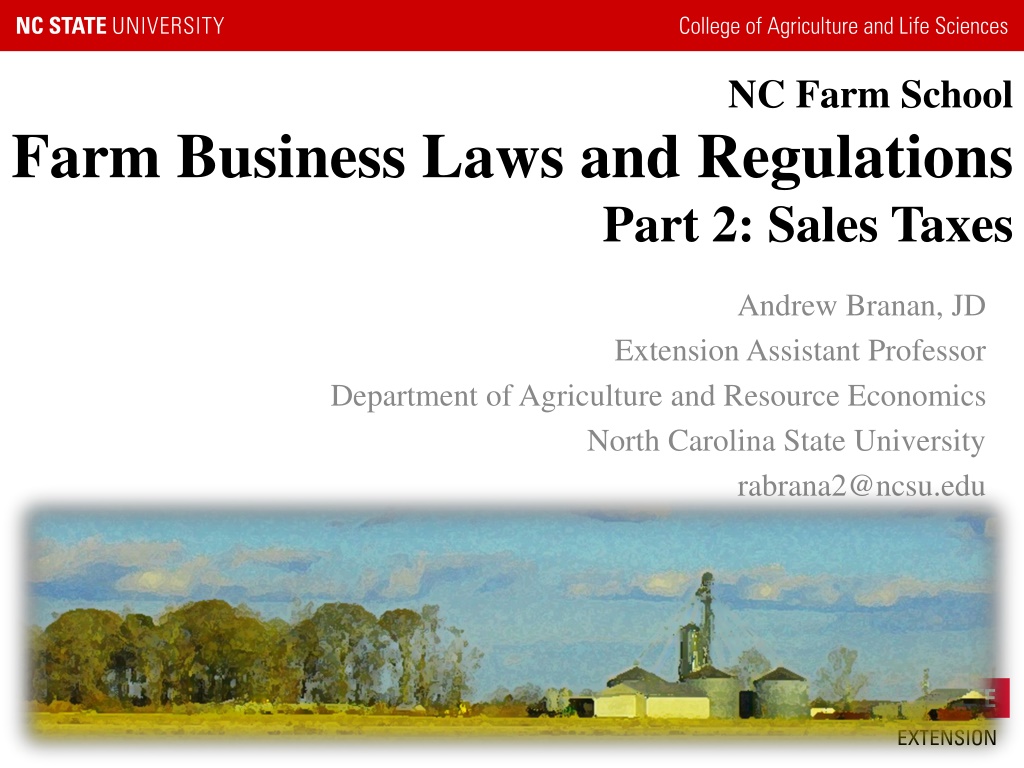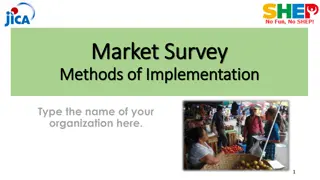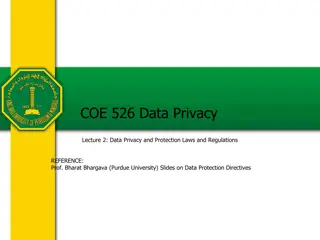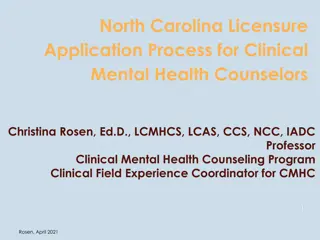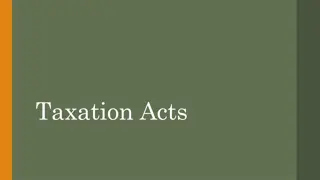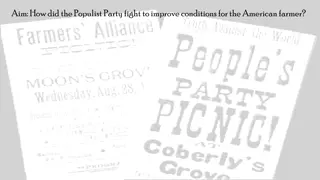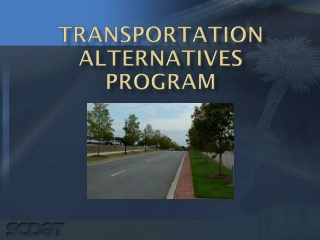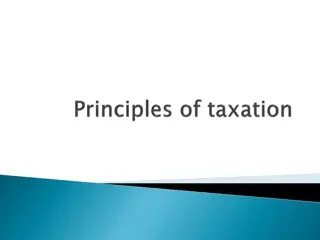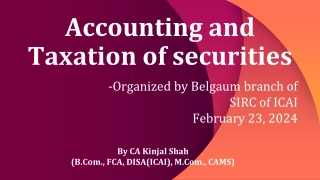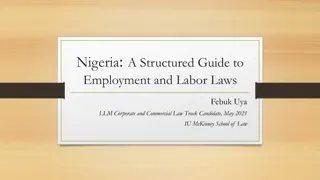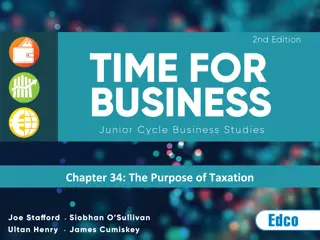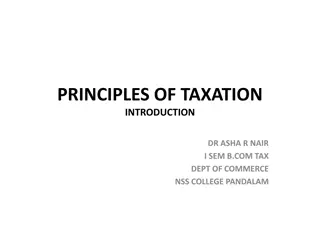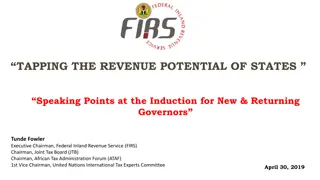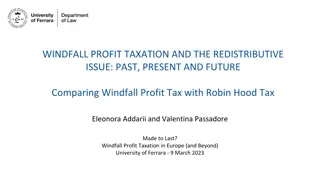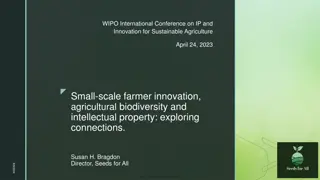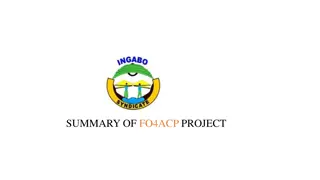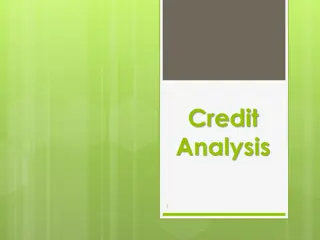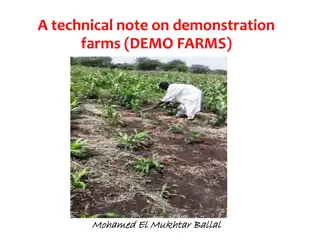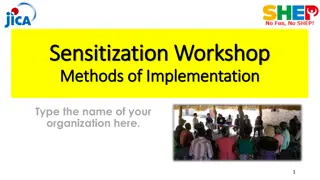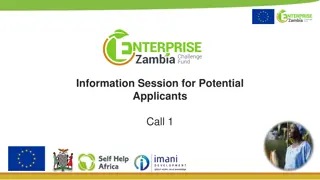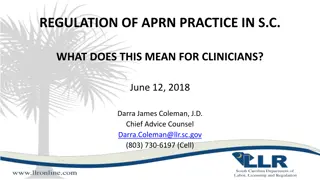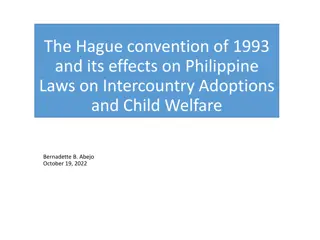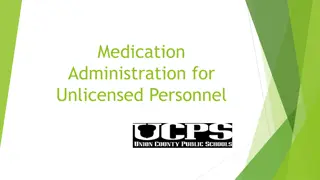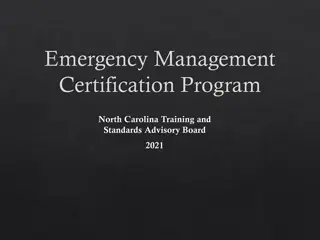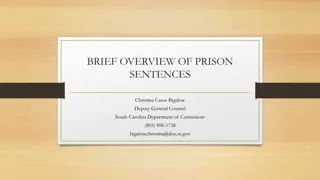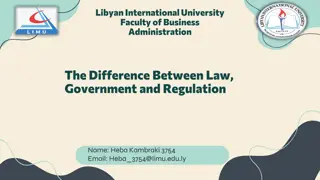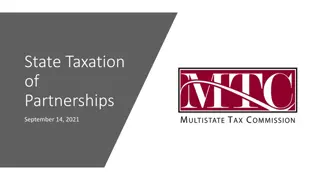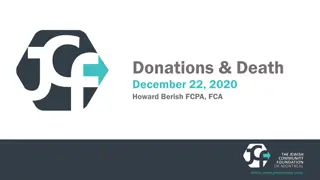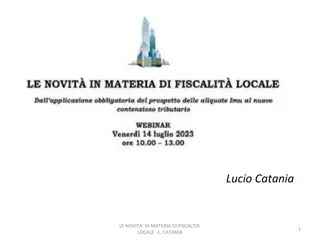Taxation Laws and Regulations for Farmers in North Carolina
Explore in-depth discussions on property tax reductions, income tax exemptions, sales tax obligations, and disaster losses for farmers in North Carolina. Learn about qualifications for tax benefits, record-keeping requirements, and potential deductions. Stay informed on recent tax legislation changes impacting agricultural businesses.
Download Presentation

Please find below an Image/Link to download the presentation.
The content on the website is provided AS IS for your information and personal use only. It may not be sold, licensed, or shared on other websites without obtaining consent from the author. Download presentation by click this link. If you encounter any issues during the download, it is possible that the publisher has removed the file from their server.
E N D
Presentation Transcript
NC Farm School Farm Business Laws and Regulations Part 2: Sales Taxes Andrew Branan, JD Extension Assistant Professor Department of Agriculture and Resource Economics North Carolina State University rabrana2@ncsu.edu
Taxes Property Tax How do I qualify my land to reduce my property tax bill? Income Tax What part of my revenue is exempt from income tax? Sales Tax When must I pay sales tax on product sale? Qualified Farmer Sales Tax Exemption (for purchases) When can I stop paying sales tax on input purchases?
Income Tax Losses NOL v. Disaster Net Operating Loss vs. Disaster Loss Tax Cuts and Jobs Act (TCJA) of 2017 eliminated the casualty loss tax deduction as an itemized deduction on personal income tax returns For losses created in tax years beginning after December 31, 2017, the NOL deduction is limited to 80% of taxable income. Carryovers are subject to this limitation too. Business disaster losses still available Sudden or fast moving Unexpected and not caused intentionally Unusual For Crop Loss: Crop Insurance Dr. Rod Rejesus rmrejesu@ncsu.edu Crop Insurance options Sign up periods
Disaster Losses Records To prove a deduction for disaster loss, must be able to prove That the taxpayer owned the property The amount of the basis or book value of the property The pre-disaster value of the asset The reduction in value caused by the disaster The lack or insufficiency of reimbursement to cover the costs
Q: How many years do you have to save receipts and tax returns? Tax laws are enforced by a) denying deductions and b) by random audit You place whatever income numbers you wish or classify items as deductible, these are open to challenge up to 3 years after due date (April 15) or extended filing date (October 15). IRC section 6501(a) 6 years: 25% under-report of gross income (or excess of $5000) IRC 6501(e) Income omissions are discoverable from filings by the taxpayer on the other side of the transaction No limitation Filing a false or fraudulent return - IRC section 6501(c)(1). Willfully attempting to evade tax - IRC section 6501(c)(2). Failing to file a return - IRC section 6501(c)(3). Solution: Scan receipts and store digitally as pdfs on CD or flash drive (minimal space, but make sure keep hardware to read)
Present Use Value Differential valuation property tax assessment Standard tax rate applied to lower value Deferred property tax Abated after 3 years 3 year roll back if property/ownership loses qualification Qualified land owned by individual 20 acres for forestry (must include forest management plan) 10 acres of farmland (row crops, pasture) 5 acres for horticulture land Must show $1000 gross annual receipts (rolling average) Read PUV Use Guide (NCDOR) for scenarios (Google) Do not dispose of land without knowing PUV status
As a Farmer, Do I Collect Sales Tax? Well It Depends If you are a producer, selling your products in their original and unmanufactured state, then these sales are exempt from sales and use tax. You are selling in the capacity of a PRODUCER
Producer v. Retailer Sales and Use Tax Bulletin Section 9-1 E.1. defines a producer as persons selling primarily as producers when the total dollar sales volume of their produced farm products in the original state regularly exceeds 50% of total dollar sales volume of their purchased products and their produced products. If a farmer becomes a retailer, then all sales, regardless of product origin, become subject to sales tax.
Payment of Sales Tax 105-164.4. Tax imposed on retailers and certain facilitators Payment of statewide rate + county rate on non-exempt sales Statewide rate: 4.75% County Rate: varies by county County by County list of total sales tax rates (statewide 4.75 + local) (April 1, 2019 list of county rates) E.g. Catawba local rate = 2.25% (7% - 4.75%) E.g. Orange local rate = 2.25% + .5% transit (7% - 4.75%) (common in urban counties)
Speaking of sales tax, is it the same for say, a plant, a cucumber a t-shirt and a necklace? Agricultural products (including wild-caught fish) are only exempt form sales tax in their unprocessed state Cucumber = no tax; Pickled cucumber = applicable county/state sales tax rate Kale = no tax; Bag of chopped kale = no tax; Bag of chopped kale with seasoning = applicable county/state sales tax rate Honey raw = no tax; Honey with spices added = applicable county/state sales tax rate List of sales tax-exempt items found in 105-164.13. (Retail sales and use tax. (Exceptions and Exclusions) Sales of processed items and crafts requires registration for sales tax remittance Must display registration on stall at farmers market or road-side stand if applicable
Agricultural Sales Exempt from Sales Tax 105-164.13. Retail sales and use tax. (Ag exemptions) (4b) Products of a farm sold in their original state by the producer of the products if the producer is not primarily a retail merchant and ice used to preserve agriculture, aquaculture and commercial fishery products until the products are sold at retail. (7) Sales of products of waters in their original or unmanufactured state when such sales are made by the producer in the capacity of producer. Fish and seafoods are likewise exempt when sold by the fisherman in that capacity. (8) Sales to a manufacturer of tangible personal property that enters into or becomes an ingredient or component part of tangible personal property that is manufactured.
Regulatory Clarification NCAC 7B.2801 North Carolina Administrative Code 7B.2801 Florists: nurserymen: greenhouse operators and farmers. (a) Retail sales of wreaths, bouquets and similar items are subject to the applicable statutory state and local sales or use tax. (b) Retail sales of flowers, potted plants, shrubbery and similar nursery stock and retail sales of fruits, vegetables and other farm products are subject to the applicable statutory state and local sales or use tax unless the product in question is a product of the farm and is sold in its original state by the producer of the product who is not primarily a retail merchant at the location where the product is sold.
Retail Merchant - NCAC 7B.2801 Such vendors are selling primarily in their capacity as retail merchants when their total dollar sales volume of purchased products regularly exceeds fifty percent of the total dollar sales volume of their purchased and produced products. (f) When vendors who are not primarily retail merchants make sales of farm products produced by them and products acquired by purchase, separate records must be maintained of sales of products produced by them. Records of purchased products, as well as sales thereof, must be kept and maintained in a manner that can be accurately and conveniently checked by the agents of the Secretary of Revenue; otherwise, all sales are subject to the tax. If you provide landscaping service as a producer, must separate items you produce on bill, otherwise total is taxed
Registration for Remittance of Sales Tax Display at Farmers Market Registration requirement G.S. 105-164.29(c) Application to Farmers Market: Those who sell items other than unprocessed agricultural products they actually produce must now provide the farmers market manager a copy of their N.C. Dept. of Revenue Certificate of Registration Those who sell items other than unprocessed agricultural products they actually produce must also display their NC Dept. of Revenue Certificate of Registration at the farmers market where it may be seen by their customers. Generally, the farmers market will not inquire about a vendor s sales tax collections or their business with the N.C. Dept. of Revenue. https://www.ncdor.gov/taxes-forms/business-registration/online- business-registration
Prepared Food Additional guidance
Sales Tax and MEAT Live animals: exempt from tax when sold by producer [G.S. 105-164.13(4b)] Cuts of meat (uncooked): subject to 2% rate on food sold by producer or retailer. Processed meat: (e.g. uncooked sausage) subject to 2% rate on food sold by producer or retailer. Cooked/smoked meat: subject to 4.75% State and applicable local sales tax.
Sales of Fruits and Vegetables Raw vegetables sold by a producer are exempt [G.S.105- 164.13(4b)] Raw veggies that are cut up and placed in bags to be sold by producer are exempt. Shelled butter beans or corn sold in plastic bags by producer are exempt. If the producer adds anything to the vegetables such as seasoning, no longer exempt, subject to 2% tax on food. Veggies or fruit sold by retailer, subject to 2% tax rate on food Fruits and veggies that qualify as a prepared food (jams and jellies) item are subject to 4.75% plus any local sales tax. Raised cut flowers, honey and firewood sales are sales tax exempt.
Registering to Remit Sales and Use Tax Online Registration (Generally Quickest) http://www.dor.state.nc.us/electronic/registration/index.html Complete and Submit Form NC-BR http://www.dor.state.nc.us/downloads/forms_fillin_ncbr.p hp?url=fillin/NCBR_webfill.pdf
Farmer Input Exemption Certificate: Exempted Items Pesticides Baby chicks and poults Commercially built facility and Building materials for raising or feeding of animals Bulk tobacco barns, racks or accessories to cure or dry tobacco Fuel and Electricity (separate meters) Fertilizer, plastic mulch, seeds, lime, land plaster Farm machinery, repair parts and lubricants Containers Grain, feed, soybean storage facility and parts
NC Sales Tax Exemption - Purchases Tangible personal property, digital property, and services exempt from sales and use tax when purchased by a qualifying farmer for use in farming operations. A qualifying farmer is a farmer who has an annual gross income for the preceding income tax year of ten thousand dollars ($10,000) or more from farming operations or who has an average annual gross income for the three (3) preceding income tax years of ten thousand dollars ($10,000) or more from farming operations.
NC Sales Tax Exemption Purchases (contd) An item is used in farming operations if it is used for the planting, cultivating, harvesting, or curing of farm crops or in the production of dairy products, eggs, or animals. For new operations Gen. Stat. 105-164.13E as rewritten allows certain persons engaged in farming operations that otherwise do not meet the definition of the term qualifying farmer to apply for a conditional farmer exemption certificate Google: Form E-595QF, Application for Qualifying Farmer Exemption Certificate Number for Qualified Purchases
New Farm - Conditional Farmer Exemption Certificate (Form E-595CF) A conditional farmer exemption certificate (CF) issued by the Department is valid for the income tax year in which the certificate is issued and the following two income tax years A person issued a CF must submit the required documentation to the Department within 90 days following the end of each income tax year covered by the CF. A conditional farmer exemption certificate may not be extended or renewed beyond the original three-year period (must file E-595CF if qualify) Fifteen year bar on new CF application
Conditional Farmer Exemption Certificate Strict Requirements CF holder must maintain documentation of the items purchased and copies of State and federal income tax returns that reflect activities from farming operations for the period of time covered by the CF and for three years following the expiration of the CF NCDOR may require a person who was issued a CF number to provide any other verification information Failure to provide the information requested by NCDOR, or qualification failure in audit triggers liability for any taxes claimed as exempt, immediately due and payable with interest. Additionally, where the person does not timely provide the information requested by the Department, the $250.00 misuse of exemption certificate penalty applies to each seller identified by the Department from which the person made a purchase
Employee Classifications Issue: obligation to pay employment taxes Employee vs. Contractor Employee (required to pay ESC, FUTA, SUTA, etc.) Generally, if you provide direction, tools, time parameters, etc., classify as employee (I-9, etc.) Contractor (contract rate only) Generally, contractor provides own tools, schedule, etc. Unpaid Intern vs. Employee Unpaid Intern: must have association with education structure, generally non-profit Employee: business gets economic benefit Pay your summer labor!
